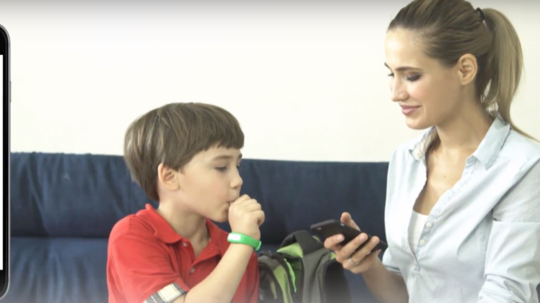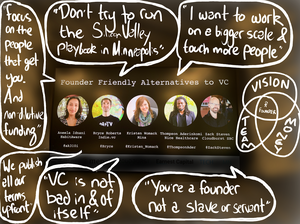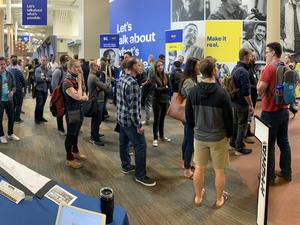
Aneela Idnani is the Co-Founder of HabitAware, a 2017 50 on Fire finalist
Here in Minneapolis-St. Paul, we’re heading into “sick season” as the weather gets cold and we all get, well, colds.
Luckily most professional companies offer paid sick leave, so as we enter these winter months, we aren’t so stressed out about the idea of possibly needing to take a day off here or there. Because when you’re sick, you simply shouldn’t go to work. It’s bad for you, your co-workers (you can spread your sickness), and your company (you’re not really productive and probably not letting anyone else get work done either).
Calling in sick when you are feeling physically unwell is a no brainer. When you call in sick because you have a cold, people get it. Your colleagues know what it’s like, as they’ve all been there: the congestion, runny nose, cough, headache, difficulty sleeping...It’s awful, debilitating and let’s face it, no colleague wants to get near you in that state.
But what about the sicknesses we can’t see, or truly understand? What about the sicknesses that aren’t common to us all? What about the sicknesses that affect your state of mind, not just your body?
As part of the 1 in 4 Americans with a mental health disorder, I never actually lied about taking a sick day “because I’m not feeling well,” but I never told the truth either.
I didn’t want to tell my bosses that the reason I was skipping out on a work day was because I was hit with a depressive state, or because I had pulled out all my eyebrows staying up working late the night before and ran out of eye pencil, or because the “doctor appointment” I had was really to see my psychologist.
Why?
Because FEAR.
Fear of discrimination, fear of judgement, fear of being labeled crazy or lazy, fear of being seen as flawed, fear of being seen as letting down my team, fear of being viewed as inferior, fear of being stigmatized.
For a long time I hid and lived in a pool of fear. And I know so many others are drowning in it, out of shame for being “broken.”
But I also know our work culture is changing. We are in a day and age where we should be able to talk about things that used to be taboo -- from gender equity to LGBTQ rights, and yes, even mental health.
If your workplace isn’t talking about these things, run. No, just kidding. BE THE CHANGE.
Here are six ways you can help end the stigma and support mental wellness at work:
- Develop empathy: In order to help end the stigma, you need to understand why people feel the need to hide their mental health conditions. I believe it is because acknowledging a mental health condition shows weakness. This weakness can allow others to call ability into question, no matter how accomplished you may be. This could mean the difference between closing a client contract or securing potential investment. The reality is that there are many high-functioning, successful people out there, who just happen to also have mental health conditions. Recognizing this can help shift perception and squash stereotypes.
- Be kind: Don’t wait for Thanksgiving to express your gratitude for your colleagues and teammates. If you see someone struggling, offer them a shoulder to lean on. Remove the words “get over it” from your vocabulary.
- Watch your language: Your words can help or hurt a situation. Throwing around phrases like “I’m so OCD” without truly understanding what it really means to be OCD is belittling. I’m all for jokes to ease tension, but not at the expense of diminishing someone else’s life experience.
- Offer support: If a colleague calls out because of a cold, you’d still likely inquire how they are feeling. The same should be true for mental health sick days. Everyone gets a little sad sometimes. Don’t wait for it to get to a depressive state. If you see a co-worker slipping up or losing their enthusiasm, find out what’s wrong and how you can re-engage them before it’s too late. Check in to see how your co-worker is doing. Ask what you can do to help. That little outreach can make the difference in their recovery, as they’ll feel a little less alone and the pressure to hide will be reduced.
- Break the silence: Stress isn’t going to go away, especially in fast-paced, tech environments. Talk about the elephant in the room and make sure people feel comfortable. You can get all formal and host a speaking engagement with experts (cough, cough, I’m available) or you can make it casual with a one-on-one lunch time chat with a colleague.
- Encourage work-life balance policies: What’s the point of having a pool table or gym in your office if no one uses it? Office culture shouldn’t demonize self care, it should embrace it. Improving quality of life for employees improves productivity. Work with HR to implement policies that can benefit everyone, not just those with mental health issues. Things like optional work-from-home days, flexible hours or setting up guided meditation once a week can go a long way to powering up the work force!
For all of you with a mental health disorder, I want to remind you, your condition does not make you unworthy of a sick day.
Wishing you all good health and keen awareness,
Aneela
About Aneela Idnani + HabitAware
Aneela grew up in the Big Apple, but now calls the Minne Apple home. She is an ex-accountant and ex-madwoman turned entrepreneur and mental health advocate. She is CoFounder, “Chief Trichster” and Design & Marketing Lead at HabitAware, a health tech company whose Keen bracelet aims to people be more aware of body-focused repetitive behaviors like nail biting or hair pulling.
Image via HabitAware Video







